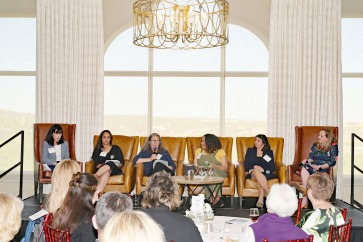Beneath the Pinery on the Hill, several of Colorado Springs’ oldest churches and neighborhoods unfold into a patchwork of diverse architecture. There is no better view of downtown than the one framed by each window in the Pinery’s massive east-facing wall of light and glass. Central to this picturesque view sits the city’s iconic golden steeple and St. Mary’s Cathedral. On the evening of April 14, with the steeple reflecting stray shards of sunlight over the landscape, the Pinery hosted: TENACITY: Women in Conservation. Sharply dressed attendees enjoyed light appetizers over an ambient city below, anticipating the five-woman panel of speakers no less brilliant than the view.
TENACITY is an annual fundraiser benefiting Palmer Land Conservancy, which advocates for protection and conservation of land and water. Since 1977, the organization has supported conserving open space and strengthening rural communities by protecting local farms. When Rebecca Jewett, president of Palmer Land Conservancy, welcomed the mostly female audience, she reminisced on the small beginnings of an event now barely contained inside Colorado Springs’ premier venue.
“Nine years ago, we started TENACITY as a tiny backyard gathering,” she shared.
She recalled a few people sitting in chairs on a lawn, sharing ideas about conservation. Jewett’s broad smile showed her pride in how the event has grown.
Her co-worker Astrid Monar noted, “Palmer Land Conservancy has outgrown this space, and that’s a good problem – a really good problem.”
Once the more than 160 guests settled into chairs arranged around white-clad table tops, the panel was introduced.

“We have the I-25 Corridor well represented,” Jewett said.
The panel included Susan D. Daggett, a law professor from the University of Denver and Executive Director of the Rocky Mountain Land Use Institute; Anna Cordova, archaeologist and manager of Garden of the Gods Park in Colorado Springs; Dr. Patience Kabwasa, Executive Director of Food to Power and a food policy advocate; Lori Weigel, owner-operator of an opinion research firm in Colorado; and Yenny Espinosa Nino, the Outdoor Equity and Education Director for the Boys and Girls Clubs of Pueblo County.
While commonalities between a law professor, archaeologist, food-waste mitigator, public opinion strategist and childhood play-advocate may not be immediately clear, Kabwasa summarized the panel’s connectedness in one sentence. “If you are a human, and you care about the food you eat,” she stated, “then you also care about land and water conservancy.” All five women on the panel applauded.
Humans are part of the ecosystem. We’re not separate from it. – Anna Cordova
Cordova was quick to agree with the connection between food, water and land conservation, saying “Humans are part of the ecosystem. We’re not separate from it.”
Cordova explained her Indigenous American heritage does not separate the human from the tree or the sky.
“All of us are one,” she said. “Being an archaeologist gives me the opportunity to also be a steward of the land.”
The theme of the night’s discussion was how conservation connects people with the things they love in nature. Daggett shared that urban planning and zoning for communities can also be viewed through the lens of conservation.
“What if Coloradans didn’t always have to drive up to the mountains to enjoy nature?” she asked rhetorically. “We can plan communities with gardens and trails right here, so there isn’t as much urban sprawl.”
Weigel said, “When I poll groups of people and ask Coloradoans if they identify as environmentalists, the numbers are pretty small; like only 30%.” She believes the term “environmentalism” has become highly political. But, Weigel pointed out, “When I poll people in Colorado, asking them what’s the most important thing about living here, the number one answer is: the environment.” Somehow, there is a disconnect between the term and the value of our outdoors.
Espinosa Nino’s job involves getting kids outside. Boys and Girls Clubs of Pueblo County serves around 2,000 youth.
“Childhood is a time to play,” she said. “My goal is to reduce the barriers that keep kids from getting outside.”
Espinosa Nino said, specifically in Pueblo, kids don’t always feel safe going outdoors. Espinosa Nino helps kids get outside to camp, hike or even fish. She announced, to laughter and agreement, “I just want [the kids] to be away from their screens.” One high point of her career, Espinosa Nino said, was taking a group of Girls Scouts camping, some of whom had never left the city.
Palmer Land Conservancy touches a broad spectrum of people and open space; not unlike the numerous rays of light reflecting off of St. Mary’s golden steeple. Community members who gift as little as $35 to Palmer Land Conservancy help protect and establish public parks, open spaces and trails in southern Colorado. TENACITY attendees Debbie and Glen Livengood became members of the Conservancy one year ago. Glen Livengood explained he contributes to the organization because he believes “they do a lot of good for nature.”
Those interested in supporting Palmer should visit PalmerLand.org/become-a-member.

